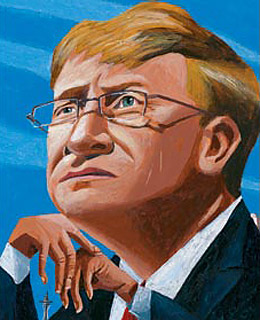
You don't have to call Bill Gates Sir. On March 2, the Queen of England made Gates a knight, specifically a Knight Commander of the Most Excellent Order of the British Empire, but the honorific Sir is reserved for British citizens. Yet at 49 Gates has been earning respect in new ways: the chairman of Microsoft and the world's richest man—his fortune is estimated at $46.5 billion—has become the greatest philanthropist in history.
Microsoft is in a bit of a lull right now. The next version of Windows, code-named Longhorn, won't ship until 2006 at the earliest; the company's next big release will be the new version of the Xbox video-game console. But Gates' other billion-dollar baby, the Bill & Melinda Gates Foundation, is working overtime, giving away its $27 billion endowment on an unprecedented scale, focusing primarily on issues related to health and education.
The Gates Foundation has put $750 million toward global vaccination efforts, with plans to double that. The World Health Organization says the foundation's efforts have already saved the lives of 670,000 children. It has also given almost $1.2 billion to educational causes. The philanthropic work softens the image of a man often portrayed as an affectless, iron-willed businessman, who in the past has run afoul of antitrust regulations in his efforts to maintain market share for Windows and other Microsoft software. But the guy who made all that money is the one giving it away: focused, immensely ambitious, scarily determined, often amazingly prescient.
From the Archive
10 Questions for Bill Gates: Sitting down with the Microsoft chairman